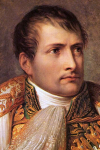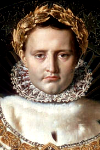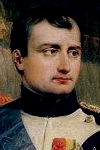The main consequence of Cadoudal's conspiracy was to allow Napoleon Bonaparte to climb the last step leading to the throne. On March 27th, the Senate, through Joseph Fouché, asked him to make his authority of hereditary nature. On April 23rd, a member of the Tribunat suggested that Napoleon would be proclaimed hereditary Emperor of the French. The motion was passed on May 3rd by the Tribunat (unanimously but for one voice, that of Lazare Carnot), and on the 18th by the Senate (unanimously but for three votes). The plebiscite ratifying this decision was approved on August 2nd with 3,572,329 votes for and 2579 against.
Napoleon, however, did not wait for the voting outcome to establish the new regime: he made his brothers Joseph and Louis French princes, Great Elector, and Constable; he appointed eighteen marshals; he chose Fouché as Minister of General Police. The Emperor dispatched the first crosses of the Legion of Honor at a ceremony organized on July 14th at the Invalides , seated on a throne, surrounded by the eagles of the French Empire, ministers, marshals, and dignitaries of the Imperial Household.
There was nothing left for him to do but be crowned as a new Charlemagne, by Pope Pius VII in person. The invitation he sent to the Pope on September 15th was accepted, and Napoleon received him on 25th November at Fontainebleau . After the necessary religious marriage of Napoleon and Josephine de Beauharnais, hastily celebrated by Cardinal Joseph Fesch on the 29th, the coronation took place on December 2nd, 1804 in Notre-Dame de Paris . The famous painter Jacques-Louis David, who has recieved an order for four pictures of the coronation, immortalized the scene.

The Italian republic, through its consultation meeting in Paris on March 15th, 1805, followed the movement promoted by France: Napoleon was crowned as King of Italy on May 26th in the cathedral of Milan. This did not prevent him from signing a week later the decree annexing Genoa and Liguria to France (June 4). Soon after, he appointed his adoptive son Eugène de Beauharnais as Viceroy of Italy.
The invasion project of Britain became then the main concern of the Emperor. He conceived a plan to take control of the Channel the time required for the invasion of England by the fleet assembled at Boulogne. But the awkwardness of Admiral Pierre Charles Silvestre de Villeneuve, who let himself be trapped in Cadiz on August 18th (from where he would finally escape in October just to be defeated at Trafalgar), forced Napoleon to abandon such idea. On August 27, the camp of Boulogne was lifted and 150,000 men were sent to the Rhine.
Indeed, pressure was mounting with Austria. Its emperor, Francis
II, who was also the emperor of the Holy German Empire, promulgated
on September 3rd, 1805 a manifest openly hostile to France, just
days after joining an Anglo-Russian pact. On the 10th, the Austrian
troops entered Bavaria. Napoleon did not take long to respond.
On the 23th, he announced to the Senate his rupture with Austria;
the next day he led the army and two days later, crossed the Rhine.
On October 7th, the Grand Army (it received such name from Napoleon
the day before, after being reinforced by Bavarian and Dutch troops)
crossed the Danube. Almost every day saw a new French victory.
Most notably the battle of Elchingen, led by Marshal Michel
Ney (October 14th), and the capitulation of Ulm (October 17th)
where 25,000 Austrians were captured. Vienna eventually fell on
November 13th although the decisive battle tooke place on December
2nd, 1805 at Austerlitz,
where the French Emperor crushed those of Russia and Austria on
the anniversary of his coronation. He celebrated the "Battle
of Three Emperors" in a brilliant proclamation: Soldiers,
I am pleased with you. You, on the day of Austerlitz, justified
everything I expected of your bravery, you have decorated your
eagles with immortal glory. [...] So simply say "I was at the
battle of Austerlitz," to hear "There goes a brave man"
.
The results were immediate: On December 4th, Napoleon and the
Emperor Francis II of Germany were meeting in Sarutschitz, Moravia;
on the 6th, an armistice was signed; on the 26th, the Treaty of
Pressburg was concluded to end in practice the existence of the
quasi-milenaire Holy Roman Empire.

In domestic politics, the year 1806 saw Napoleon accentuate the monarchical regime. The Emperor brought the son of Josephine de Beauharnais, Eugène and his cousin, Stephanie, into the princely families. He also began to distribute titles of nobility to his relatives: on March 15th, Joachim Murat was appointed Grand Duke of Berg; on the 30th, Joseph Bonaparte officially took the title of King of Naples (even though André Masséna had not yet fully completed the conquest of the kingdom), Elisa Bonaparte became Princess of Massa-Carrara, Pauline Bonaparte Duchess of Guastalla, Louis-Alexandre Berthier Prince of Neuchatel. Further appointments on June 5th: Louis Bonaparte was made King of Holland, Jean-Baptiste Jules Bernadotte Prince of Pontecorvo, Charles-Maurice de Talleyrand Prince of Benevento. On August 14, Napoleon established the primogenitures, hereditary fiefs of the Empire. The next day, the anniversary of the Emperor, saw a solemn celebration according to a decree issued in February.
Napoleon's will to enhance the luster of the regime also appeared in his policy of public works: Beautification of Paris by building triumphal arches of the Etoile and the Carrousel ; commissioning of sixty-five fountains in Paris; canal project to ensure the junction of the Rhone and Rhine.
While Napoleon was continuing domestic reforms (creation of employment tribunals, foundation of the University, establishment of an assembly of notables of the Jewish faith in order to organize the worship), foreign policy remained at the forefront of the imperial concerns. The struggle with England lied in the economic sphere: On February 22nd, 1806, a decree prohibited the introduction in France of cotton fabrics manufactured abroad; on May 16th, the British government decided to block off the coasts and ports from the River Elbe up to Brest; on June 10th, the importation of British goods into the Kingdom of Italy was prohibited.
This trend had implications for Napoleon as it drave him to require Pope Pius VII to action against British commerce, which the latter refused to apply. The case turned into a sovereignty dispute between the Pope, who considered himself the legitimate monarch of Rome and the Emperor, who called himself the Lord on the grounds of his title. In June, Napoleon occupied the harbour of Civitavecchia, a few kilometers from Rome, but the matter did not develop any further as more pressing concerns required his attention.
In fact, intense diplomatic activity occupied the summer months, caused by the onset of favorable conditions for finding a global balance of power: the death of British Prime Minister William Pitt, a fierce opponent of the French Revolution and all its avatars, and the recent defeat of Austria, some clauses of the Treaty of Pressburg in favor of Prussia, which made a Franco-Prussian alliance apparently feasible. Discussions began on June 13th with a representative of England, and on July 6th with the envoy of the Czar Alexander I in Paris, whose arrival had followed closely the confirmation by King Frederick William III of Prussia of his alliance with Russia (June 30th). July 12th 1806 saw the birth of the Confederation of the Rhine, political entity which was placed immediately under the protectorate of the French Emperor, soon followed, on August 6th, by the renunciation of Francis II to his title of German Emperor. Franco-Russian talks ended on July 20th with a draft agreement sent to the Tsar; the Anglo-French ones ended on August 7th with a draft treaty that Napoleon delayed approval pending the decision of Alexander I.
A first negative signal was sent to Napoleon on August 9th by Prussia with the mobilization of its troops. On September 3rd, Tsar Alexander I notified his refusal to ratify the project signed by his envoy and on the 12th the Prussians entered Saxony. Instead of the expected peace, war was on.
Napoleon left Paris on September 25th. The first fight of the campaign took place on October 9th. On the 14th, the twin battles of Jena and Auerstadt sealed the fate of Prussia. Until November 16th with the signing of an armistice, the French armies took possession of the Prussian cities and provinces without major opposition, as these were unable to defend themselves or were demoralized. Joachim Murat reached Erfurt on October 16th with its fourteen thousand defenders; Leipzig fell on the 18th; on the 27th, Napoleon entered Berlin, where he soon declared a blockade of the British Isles; on November 7, the Prussian General Gebhard Leberecht von Blücher capitulated. The arrival of the Russians on November 11th proved too late to save Prussia but sufficient to sustain the king's refusal to ratify the armistice signed on the 16th. The French continued on, and entered Poland. On the 28th, Murat entered Warsaw. Napoleon joined him there on December 19th. On the 22th, the Vistula River was crossed and, after a few minor wins, the French army set its winter quarters at Pultusk.

On January 1st, 1807, Napoleon met Maria Walewska. He saw her again in the month at a ball and fell in love. This young Polish woman, initially reluctant, yielded to patriotic reasons and soon became his mistress.
But military operations resumed quickly, despite the season. Napoleon had just enough time to install an interim national government in Poland, before leaving Warsaw on January 30, 1807. February 8th saw the undecisive battle of Preussisch-Eylau. Hostilities were interrupted in Poland but continued in Germany. Between April and June, Finkenstein castle became both Napoleon's campaign headquarters and the place hosting his love affair with Maria Waleska. In its walls Napoleon learned, on April 25, that the King of Prussia and the Emperor of Russia had renewed their alliance, pledging not to deal with him before France would have been reduced to the limit of the Rhine. On May 4, he signed there a treaty with the Persian Ambassador. It was also during this period that Napoleon learned that a former mistress, Eleanor Denuelle de la Plaigne, had given birth to a son, the future Count Leon, whom he was the father - which proved him he was not sterile.
The Emperor began in early June the campaign against the Russians, who had taken the offensive at the end of May with Levin August von Bennigsen. On the 14th, Napoleon obtained a dazzling victory in Friedland. A week later, the Russians signed an armistice. A few days later, on the 25th, Napoleon and Alexander I met on a raft in the middle of the Niemen River for the Tilsit conference. They were soon joined by the King of Prussia and his wife Louise. Two peace treaties were signed: On July 7th, between France and Russia and on the 9th, between France and Prussia. On the 22th, the Grand Duchy of Warsaw was created.
Napoleon returned to France, while Guillaume Brune mastered the Swedes, who had on July 8th the bad idea to break an armistice signed on April 18th. They accepted, however, another one on September 7th.
The establishment of the continental blockade now drave Napoleon's
European policy. The decree of Fontainebleau, on October 13th,
set out the measures to be taken by the allies of France to enforce
it. On November 11th, the British government responded by requiring
all neutral ships to pass through England before entering the
continent. On November 23rd, Napoleon replied with the Milan decree,
which stated that: Any vessel, under any flag whatsoever,
lending itself to an English visit or entering a port in England,
will be considered as English and treated as such
.
The Portuguese were the first to bear the brunt of this new state of things: already threatened by Napoleon in late July due to their trade with England, they saw the French troops under the command of Jean-Andoche Junot entering the country on November 19th, causing the flight to Brazil of the royal family, and taking Lisbon on the 30th. Now, even if Napoleon and the Spanish Prime Minister Manuel Godoy agreed at the moment to share Portugal (secret treaty of Fontainebleau, October 27th), the conflict of King Charles IV of Spain against his son Ferdinand quickly complicated relations between France and Spain. On November 13th, General Dupont de l'Etang crossed the Pyrenees with an army of 25,000 men.
Napoleon's blockade also had consequences for the Danish: Copenhagen was bombed by the British fleet (September 2nd) and surrendered under the bombs, while the British withdrew taking the Danish fleet along. Accordingly, Denmark signed on September 30th a treaty of alliance with France, and on November 7th Tsar Alexander I, in protest against the bombardment of Copenhagen, placed Russia at war with England.
The rest of Europe did not escape the turmoil. On August 18th, Napoleon created for his brother Jerome the Kingdom of Westphalia and made him marry Princess Catharina Frederica of Württemberg on the 22nd. On the 27th, the Emperor gave the order to occupy a number of papal provinces; on September 4th, he closed the Dutch ports to British trade; on November 23rd, he removed the kingdom of Etruria, which became again the Tuscany and was occupied by the French.
All these imperial decisions were not without resistance, even in the corridors of power: On August 9th, Charles-Maurice de Talleyrand lost the Foreign Ministry, in December, Lucien Bonaparte, who refused to divorce to lend himself to the marriage policy of his brother, quarreled with Napoleon. More seriously, Pope Pius VII rejected, on December 2nd, the treaty negotiated at Fontainebleau by his cardinals. On the 13th, the German philosopher Johann Gottlieb Fichte delivered his first speech to the German nation, which awakened the Germanic nationalism.
In domestic politics, the year 1807 was distinguished by the suppression of the Tribunat on August 19th, the publication of the commercial code on September 11th and the creation of the Court of Auditors on the 16th of that month.